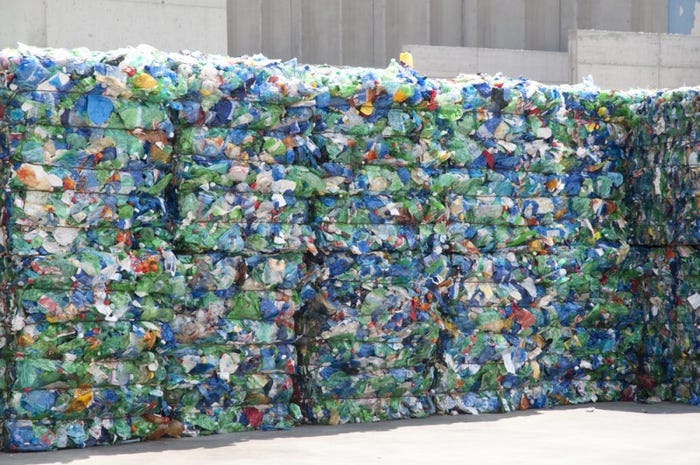AMI Conference to explore the end of life of plastics
While there is no doubt that plastics play a vital role in preserving foodstuffs, there must be a recovery in place for the polymers after use in some form. The current options include recycling, plastics to fuel, burning for energy and chemical degradation back to the primary monomers to recreate virgin plastics. The latter is still being developed, mainly in Japan, and needs to get to an economically viable scale.
March 28, 2014
While there is no doubt that plastics play a vital role in preserving foodstuffs, there must be a recovery in place for the polymers after use in some form. The current options include recycling, plastics to fuel, burning for energy and chemical degradation back to the primary monomers to recreate virgin plastics. The latter is still being developed, mainly in Japan, and needs to get to an economically viable scale. These options and more will be discussed at the AMI international conference on End of Life Plastics 2014, with a welcome evening on June 16 and a program of presentations on June 17-18 in Dusseldorf.
The Chinese have a vast recycling industry that has been importing from the rest of the world and this will be highlighted in a market paper by Steve Wong Chor Kie, managing director of Fukutomi Co. and executive president of the China Scrap Plastics Association. From Europe Ton Emans, president of Plastics Recyclers Europe, will give an overview of recycling. Scandinavia has a well-deserved reputation for "going green" and the region has put in place a variety of options for plastics waste from energy recovery to recycling, which will be presented by Professor Christer Forsgren of Stena Recyling International. From Belgium, Group Machiels has plans to mine landfill sites for valuable resources such as plastics.
 The whole lifecycle of a product needs to be taken into account when looking at sustainability, from the source of the material through transport to recovery or landfill, plus the environmental benefits that the product brings in its lifetime. Cynar has developed a technology to produce liquid fuel from used plastics, giving a second life to the materials. In France, Carbios has a new option of enzymatic techniques for breakdown of waste plastics. Meanwhile the automotive industry is taking a lead in looking at closing the circle for its materials - Keith Freegard of Axion Recycling is looking at the next steps to make this happen.
The whole lifecycle of a product needs to be taken into account when looking at sustainability, from the source of the material through transport to recovery or landfill, plus the environmental benefits that the product brings in its lifetime. Cynar has developed a technology to produce liquid fuel from used plastics, giving a second life to the materials. In France, Carbios has a new option of enzymatic techniques for breakdown of waste plastics. Meanwhile the automotive industry is taking a lead in looking at closing the circle for its materials - Keith Freegard of Axion Recycling is looking at the next steps to make this happen.
The legislative bodies in each region are putting in measures to increase the recovery of waste plastics. In the European Union, this includes laws on producer responsibility and many buy into recovery schemes to cover this liability. Tina Van Poelvoorde, Attorney-at-Law, has reviewed the consequences on waste plastics recycling of the recent changes in EU Directives. Der Grune Punkt has looked at the effect of the changing market conditions on post-consumer packaging recycling and Albemarle has reviewed the new challenges for WEEE recovery.
Flexible Packaging Europe has examined the resource efficiency of flexible packaging in relation to the end of life options. There is a big debate raging at the moment on whether degradable plastics affect the quality of recovered plastics materials, particularly in packaging. The Transfercenter fuer Kunststofftechnick (TCKT) has studied the impact of degradable plastic bags on the mechanical recycling of LDPE.
PET bottle packaging is a good example of an effective system of plastics recovery and re-use, AMI states. The Coca-Cola Hellenic Bottling Company will give a brand owner's view on this subject. Next Generation Recyclingmaschinen has new liquid state polycondensation technology for PET upcycling and Gneuss Kunststofftechnick has improved equipment for PET recovery. After recovery of plastics there are compounding and blending options to upgrade performance. For example, Vertellus Specialties has a copolymer to improve the performance of polyamides (nylon).
There is new counter-current technology from Erema Engineering Recycling Maschinen Und Anlagen to improve the efficiency of plastics recycling. Most plastics waste is recovered as a mixture of materials and requires sorting: Buhler Sortex is a leading player in mechanical and electronic grading technology. It is a worldwide issue when rubbish is discarded without recovery and the Deutsche Gesellschaft Für Internationale Zusammenarbeit is working with developing countries to minimize marine litter, which is harming our oceans.
The End of Life Plastics 2014 puts the recovery of plastics on the debating table in Dusseldorf in June and all are welcome to attend.
About the Author(s)
You May Also Like


